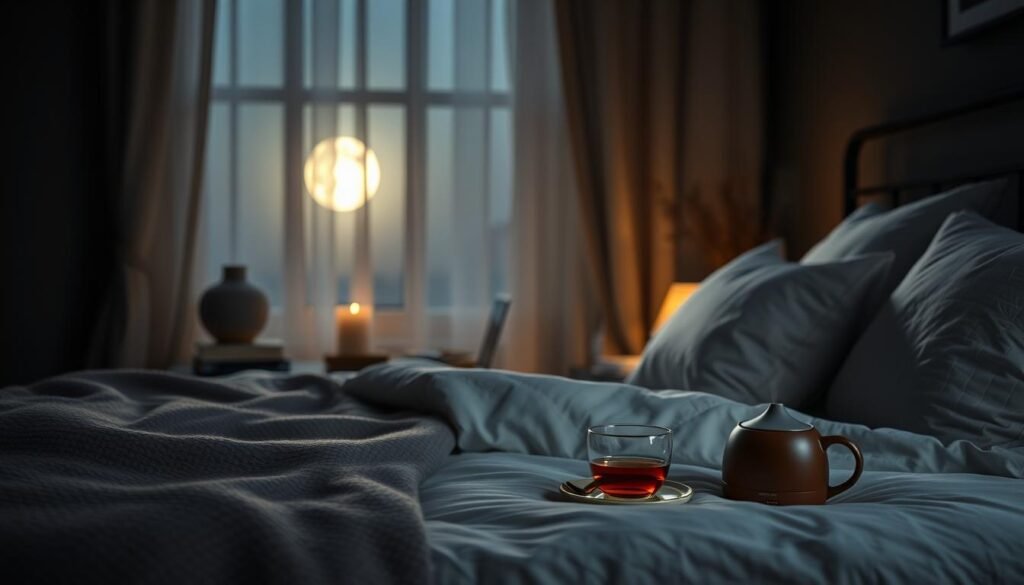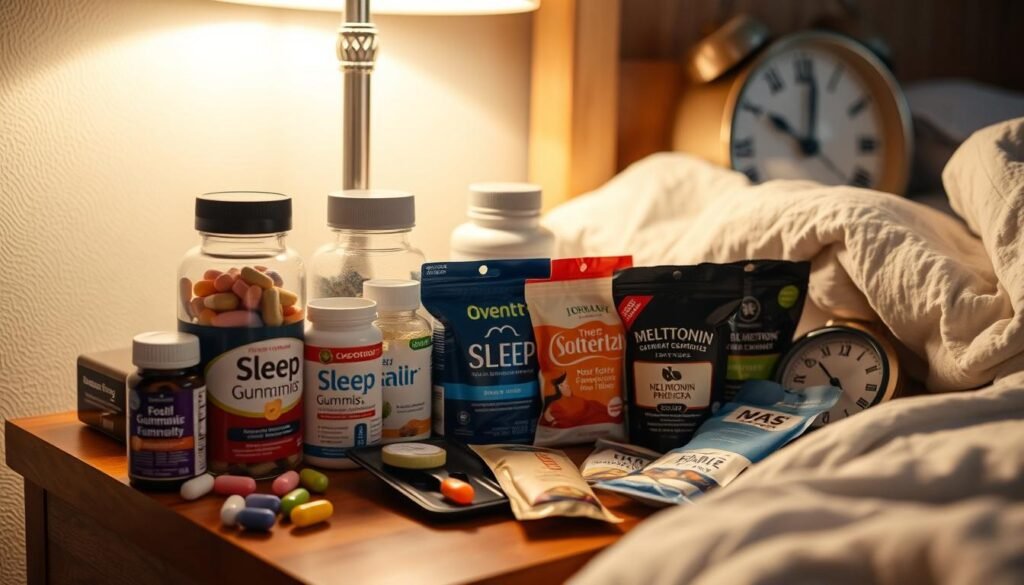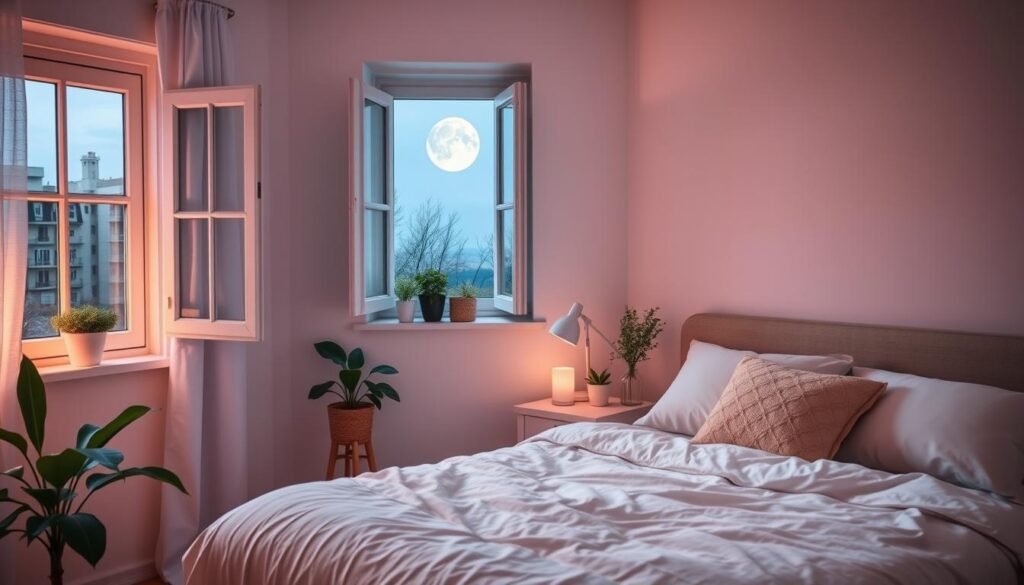About one in five Americans battle with sleep maintenance insomnia. If you find sleep elusive, there are quick ways to help. This piece offers immediate tips, covers why sleep dodges us, and when to seek more help. It also delves into both natural and clinical ways to catch those Z’s. A restful night is within reach with the right approach.
Key Takeaways
- Chronic insomnia affects sleep patterns at least three times a week for over three months.
- Reading books in bed may enhance sleep quality compared to other pre-sleep activities.
- Melatonin supplements can assist with sleep induction, typically taken 2 hours before bedtime.
- Over-the-counter sleep aids often contain antihistamines and are not intended for long-term use.
- Creating a comfortable sleep environment can significantly reduce insomnia symptoms.
- Consistent relaxation techniques like deep breathing can help alleviate acute insomnia.
Understanding Insomnia and Its Causes
Insomnia affects our daily lives and health greatly. It’s important to know the different types and what causes it. Knowing this helps us find the right treatment.
Types of Insomnia
Insomnia comes in two main forms, acute and chronic:
- Acute Insomnia: This is short-term, often due to stress or environmental changes, like travel.
- Chronic Insomnia: This type lasts longer, with sleep issues happening three times a week for over three months. It usually needs more thorough treatment.
Common Underlying Factors
Many factors can lead to insomnia, and it’s crucial to figure out the cause for the best remedy:
- Stress and Anxiety: Big life changes or constant stress can disturb sleep, making it hard to wind down.
- Lifestyle Choices: Not keeping a regular sleep schedule, staying inactive, and too much screen time can mess up our natural sleep cycles.
- Medical Conditions: Health issues, like chronic pain or depression, can also be at the root of insomnia.
Understanding the common causes of insomnia helps in finding the right treatment. Lifestyle changes and treatments, like Cognitive Behavioral Therapy (CBT), are effective. By knowing what leads to sleep problems, steps can be taken to sleep better.
Signs You Need Quick Emergency Insomnia Treatment
It’s important to know the signs of insomnia for effective relief. Many people don’t realize their sleep issues need quick attention. Recognizing symptoms is key to improving your health. Symptoms include trouble falling asleep, waking up often, and feeling tired during the day.
Recognizing Sleeplessness
Spotting sleeplessness signs early can mean you need urgent help. Look for these signs:
- Continuous struggle to fall asleep for more than 30 minutes often.
- Frequent night awakenings or trouble sleeping again, which hurts sleep quality.
- Feeling too sleepy in the day, leading to accidents or not doing well at work.
- Increased irritability or mood changes, impacting your relationships.
- Having brain fog or trouble focusing, which affects thinking.
When to Seek Help
See a healthcare provider if insomnia messes with your daily life. You should get help if:
- You feel really anxious, depressed, or have other mental health issues affecting sleep.
- You can’t sleep well even after trying basic sleep hygiene steps.
- Your insomnia has become a long-term issue.
Emergency insomnia treatments vary, from lifestyle changes to medical options. It’s good to look at resources that talk about effective sleep problem treatments.
Natural Sleep Aids for Immediate Relief
If you’re looking for natural ways to sleep better, there are many good options. They’re gentle and have fewer side effects than sleeping pills. Herbal teas and melatonin supplements are top choices. They improve your sleep quality.
Herbal Teas for Better Sleep
Some herbal teas are great for relaxation. For example, chamomile tea can help you sleep better. Drink a warm cup before bedtime for a peaceful night. Another great choice is lavender tea. Its scent also helps you relax. These teas make it easier to fall into deep sleep.
Importance of Melatonin
Melatonin is a hormone that helps you sleep. It’s great for treating short-term sleep troubles or jet lag. It tells your body when it’s time to sleep. Taking 1 to 3 milligrams of melatonin can help, without the downsides of other sleep aids.
You might want to try these natural sleep aids. They can be part of making your overall health better. Always talk to a doctor before trying new sleep remedies to make sure they’re safe.
Deep Breathing Techniques to Induce Sleep
Deep breathing exercises are a great way to fight insomnia. They calm the mind and body. This makes them ideal for people who need help falling asleep fast. By focusing on relaxation, these techniques lower sleep-related anxiety. Making deep breathing part of your bedtime routine helps you sleep better.
How to Practice Breathing Exercises
There are many breathing exercises that help improve sleep. Here are some that work well:
- 4-7-8 Breathing: This was created by Dr. Andrew Weil. You breathe in for 4 seconds, hold it for 7, and breathe out for 8. It’s been shown to help control breathing and bring calmness.
- Box Breathing: You inhale for 4 seconds, hold for 4, exhale for 4, and pause for 4 seconds. Studies show it can lower stress and boost mood.
- Diaphragmatic Breathing: This encourages taking deep breaths from your diaphragm. It helps you relax and increases oxygen in your blood.
- Alternate Nostril Breathing: A traditional yoga breathing that lowers heart rate and stress, improving well-being.
Guided Meditation Options
Guided meditation is another great way to relax and beat insomnia. Many apps and websites offer special sessions for sleep. These meditations include breathing exercises, storytelling, and calming sounds. They help your mind relax and reduce stress. Trying these options can help you find the best way to relax and sleep well.
Creating a Sleep-Friendly Environment
Making a cozy sleep area can really boost your sleep, especially in stressful times. To do this, manage room conditions and keep distractions away. This can turn your space into a rest sanctuary.
Getting started with sleep disorder treatments often includes making your bedroom sleep-friendly.
Optimizing Room Conditions
To set up the perfect sleep space, think about several factors that can impact your rest:
- Temperature: Aim for a comfy room temperature, around 60-67°F, for better sleep.
- Bedding: Choose quality mattresses and pillows for body support and comfort.
- Aromatherapy: Try relaxing smells like lavender or chamomile for more calmness.
- Decor: A tidy room without clutter can help you feel at peace and less distracted.
Reducing Noise and Light Distractions
Cutting down on outside noises and lights can help you sleep better. Here are some tips for a peaceful sleep setting:
- Blackout Curtains: Use these to stop outside light and make your room darker for sleep.
- White Noise Machines: These can cover up annoying sounds and help you sleep without interruptions.
- Limit Electronics: Don’t keep screens in your bedroom and avoid devices with blue light before bedtime.
| Element | Optimal Conditions | Reasons for Importance |
|---|---|---|
| Temperature | 60-67°F | Supports deeper, uninterrupted sleep |
| Bedding | Quality mattress and pillows | Ensures comfort and proper alignment |
| Light | Darkened room | Promotes melatonin production for sleep induction |
| Noise | Minimal disturbances | Helps maintain a consistent sleep cycle |
Emergency Insomnia Treatment: Quick Sleep Induction Methods
When you need sleep fast, certain methods come to the rescue. Techniques like progressive muscle relaxation and stimulus control are key. They help with immediate sleeplessness and can be part of broader therapy plans.
Progressive Muscle Relaxation Techniques
This method starts with tensing and then relaxing various muscle groups. It helps lower stress and anxiety, leading to sleep. Repeating this method deepens the connection to your body, aiding in relaxation. Studies prove that combining this with deep breathing works even better.
Stimulus Control Methods
These methods improve your sleep environment. They suggest using your bed only for sleep, not for watching TV or work. Stick to a sleep schedule, and go to bed when you’re truly tired. Changing how you view your sleeping space can help you fall asleep faster. For top tips, check out Healthline.

Relaxation Techniques for Sleeplessness Relief
Dealing with sleeplessness can be tough. But certain methods really help in getting good sleep. Stress and tension often cause sleepless nights. This impacts our health big time. We will look at how yoga and warm baths or massages can fight insomnia.
Yoga and Its Benefits
Yoga is a powerful way to relax. It mixes physical movements with being mindful. This helps lessen stress and worry. Doing yoga makes your body flexible and teaches you to breathe deeply. This can help lower stress hormones, making you feel calm and ready to sleep.
Many people say yoga helps them fight insomnia. About 23% of adults with trouble sleeping have tried yoga. They find it effective. Yoga, tai chi, and meditation can make it less likely for you to have insomnia.
Using a Warm Bath or Massage
Having a warm bath or getting a massage can beat insomnia. A warm bath makes your body relax by warming it up and getting blood moving. A gentle massage after can help loosen tight muscles. This helps both your body and mind unwind.
These methods really work against insomnia. Stress is a big reason people can’t sleep. Warm baths and massages offer a way to handle this stress. Checking out stress relief techniques might help you find peace and sleep better.
Over-the-Counter Solutions for Sleeplessness
Many people look for instant help with insomnia. They often turn to over-the-counter sleep aids. These include antihistamines like diphenhydramine and doxylamine. It’s crucial to know their side effects and how to use them safely.
Common OTC Sleep Aids
People struggling to sleep have many over-the-counter options. Here are some popular choices:
| Sleep Aid | Active Ingredient | Common Brand Names | Potential Side Effects |
|---|---|---|---|
| Diphenhydramine | Antihistamine | Advil PM, ZzzQuil | Drowsiness, dry mouth, dizziness |
| Doxylamine | Antihistamine | Unisom Sleep Tabs | Daytime drowsiness, headache |
| Melatonin | Dietary Supplement | Melatonin Tablets | Headache, nausea |
| Valerian Root | Dietary Supplement | Valerian Tea, Valerian Capsules | Dizziness, gastrointestinal discomfort |
Safety and Usage Considerations
While over-the-counter sleep aids offer quick fixes, careful use is needed. The FDA warns that misusing these, especially diphenhydramine, can cause severe health problems. This includes seizures or heart complications.
Many older adults, about 35%, take these OTC medications. With 12% using sleep aids. They should consult a doctor first due to the higher side effect risks. This ensures they don’t face harmful drug interactions and understand safety.
For detailed advice on choosing OTC sleep aids safely, visit this resource.

Prescription Medications for Insomnia
People with insomnia can find relief with prescription medications. It’s important to know the difference between short-term and long-term options. Short-term treatments help right away. Long-term medications are for regular use.
Short-term vs. Long-term Options
Short-term medicines, like Restoril (Temazepam), Triazolam (Halcion), and Zolpidem (Ambien), are usually prescribed for 7 to 10 days. They help quickly with sudden insomnia. Long-term prescriptions, such as Ramelteon (Rozerem) and Belsomra (Suvorexant), provide ongoing support for persistent sleep problems.
| Medication | Type | Typical Duration |
|---|---|---|
| Restoril (Temazepam) | Short-term | 7 to 10 days |
| Triazolam (Halcion) | Short-term | 7 to 10 days |
| Zolpidem (Ambien) | Short-term | As needed |
| Ramelteon (Rozerem) | Long-term | Ongoing |
| Belsomra (Suvorexant) | Long-term | Ongoing |
Discussing Side Effects with Your Doctor
Talking with your doctor about possible side effects of sleep meds is vital. Side effects vary between medications and can affect wellbeing. Common ones include dizziness, grogginess, and mood changes. A doctor’s guidance ensures a safe and effective treatment plan.
Lifestyle Changes to Prevent Future Insomnia
Making some life changes can really help stop sleep problems. By sticking to regular routines and mindful habits, you can sleep better. Knowing how your daily actions affect sleep can lead to good insomnia cures and better health.
Establishing a Sleep Schedule
Keeping the same sleep schedule is key for better sleep. Going to bed and getting up at the same time daily helps your body’s sleep cycle. Getting some sunlight right after waking up helps set your body clock. This makes you feel awake during the day and sleepy at night.
Having a steady routine makes your body crave sleep more. This helps a lot when you’re trying to sleep better.
Limiting Stimulants and Naps
Cutting down on stimulants like caffeine and nicotine is important for good sleep. Around the world, people drink 1.4 billion cups of coffee every day. Even though 400 mg of caffeine is usually okay, not everyone reacts the same way. To sleep well, don’t have caffeine six hours before bed. Also, try not to smoke for 45 minutes before sleeping. Taking short naps can be refreshing, but long or late ones can mess up your sleep. Finding the right balance in your daily routine is key to avoiding insomnia.

Conclusion
In conclusion, facing insomnia needs a hands-on method to handle sleep health. About 24% of adults suffer from it. This shows how crucial it is to look for urgent help. There are many ways to ease sleeplessness. These include natural remedies, behavior strategies, and store-bought aids. They help in fighting insomnia.
This article shed light on several strategies. They include making your sleeping area more welcoming and trying cognitive behavioral therapy. These solutions do not just fix short-term issues. They also help people change their sleep habits for better long-term health. Despite this, it’s important to note not everyone responds well to cognitive behavioral therapy. About 19% don’t see improvements. So, trying different methods can offer a personalized solution.
Understanding how insomnia affects one’s social and health life is vital. It’s especially common in women. Knowing this helps people to choose the right way to deal with it. Using proven and new methods can lead to better sleep. And better sleep improves life quality in many ways.